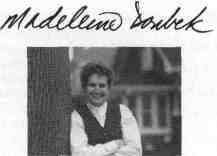 |
Home | Search | Browse | About IPO | Staff | Links |
 |
Home | Search | Browse | About IPO | Staff | Links |
A VIEW FROM THE SUBURBS
There won't be much in this fall's political harvest to excite liberals by Madeleine Doubek Scan the political horizon. Peter Fitzgerald. Glenn Poshard. George Ryan. Jim Ryan. Al Salvi. Chris Lauzen. Does the sun rise and shine on a growing crop of social conservatives? It certainly appears so. For the first time in years, Illinois' next governor will be a man who, at least for the most part, opposes abortion. In fact, five of the seven Republican statewide nominees are white men who oppose abortion. A few also favor gun rights and school vouchers, and oppose creation of laws sought by gays and lesbians. Have social moderates and liberals been choked out by this new field of conservatives springing up on the Illinois prairie? Bill Atwood, the Republican president of a money management consulting firm and a former strategist in congressional and presidential races in this state, argues economic conservatism took root years ago, but only recently have social conservatives fielded credible candidates. Democratic governor candidate Poshard's nomination, Atwood says, "clearly shows the whole spectrum is moving a little bit." There certainly won't be much in the fall political harvest to entice moderates and liberals. A handful of suburban abortion rights activists has been picking through the political produce since the primary. They see no bounty. "I'm thinking of taking a pass" in the governor's race, Democratic activist Mary Ewert, president of McHenry County Citizens for Choice, said after a recent meeting with Poshard's top aides. "I'm thinking of sitting on my hands." Of course, social conservatives likely suffered similar angst through 22 years of governing by GOP moderates Jim Thompson and Jim Edgar. But while conservatives are asserting themselves in the primaries, there's no evidence this right-leaning crop is the first of many to come. This season, though, social conservatives have plenty to excite them. There's Poshard and GOP governor nominee George Ryan. Two years after Wauconda-area resident Salvi lost the Senate general election, he has bounced back as the GOP'S secretary of state nominee. He is joined by conservative Republican newcomers, Senate nominee Peter Fitzgerald of Inverness and comptroller nominee Chris Lauzen of Aurora, each of whom beat opponents who were more socially moderate. But while social conservatives seem to be asserting some control of the statewide Republican primary process, there is no evidence to suggest the right-leaning crop of 1998 statewide candidates is the first of many to come. Poshard's primary victory grew from monolithic downstate roots, as well as the efforts of a rejuvenated labor coalition and key Chicago ward bosses. Voter turnout dropped 3 percent from 1994 in liberal-leaning Chicago, while it jumped 6.6 percent downstate. "I don't think it was so much an ideological vote that nominated Poshard as a regional one," says Democratic media consultant David Axelrod. After all, he notes, 62 percent of Democratic primary voters cast ballots for other candidates. And while Salvi, Fitzgerald and Lauzen call the Republican-rich suburbs home, they find few comforts here. Suburban residents who voted fell more to the moderate end of the political spectrum. The more liberal-to-moderate Republicans won all of the contested primaries in a half-dozen legislative races across the northwestern and western suburbs. Fitzgerald was beaten in his own backyard, losing Cook and all of the collar counties but Will. Lauzen lost in McHenry, Lake and Will counties. Only Salvi carried Cook and every collar county except Lake against fellow Lake County Republican Robert Churchill. As they prepare to face a broader-based electorate this fall, even the socially conservative candidates are wary of declaring the dawn of a new prairie conservatism. "I don't think [voters are] becoming more conservative," says Poshard. "They're becoming more independent. You talk partisan politics, people now just turn it off." And Salvi? "It's not just a conservative victory; it's also a victory for new blood and new people and fresh ideas," he says. "If you look at Peter Fitzgerald and me and Chris Lauzen, we've all sort of moderated our stands on a couple of issues." Salvi learned first-hand about the benefits of moderation in Illinois. He switched to support some gun control measures after his 1996 loss to Democratic U.S. Sen. Dick Durbin. "I'm learning that the political pendulum keeps swinging back and forth," Salvi says. Madeleine Doubek is political editor for the Daily Herald, a suburban metro newspaper. Illinois Issues July/August 1998 ¦ 41 |
|
Sam S. Manivong, Illinois Periodicals Online Coordinator |